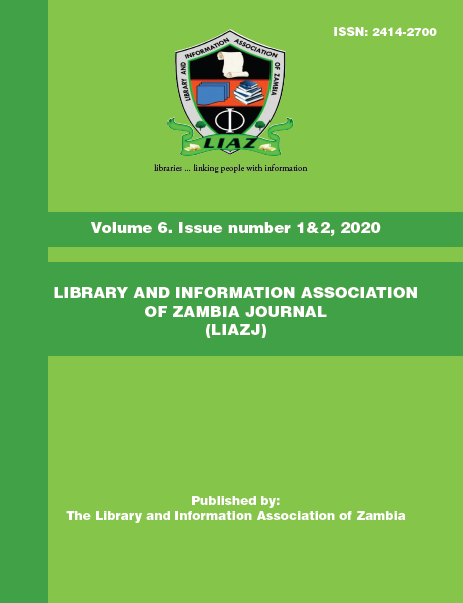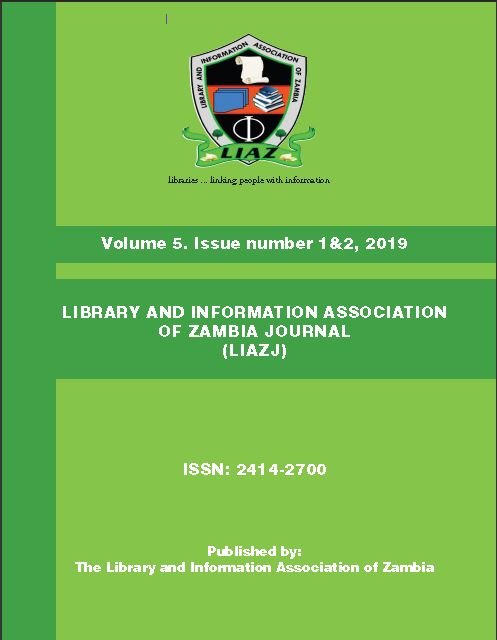Volume 6, Number 1& 2 of 2020
 We welcome you to this issue of the Library and Information Association of Zambia Journal, Volume
We welcome you to this issue of the Library and Information Association of Zambia Journal, Volume
Number 1 & 2 of 2020. This issue has papers covering areas in heritage, e-resources, information
needs seeking behavior as well as the role of Information and Communication Technologies in literacy
development.
The paper on e-resources focuses on the impact e-resources have on students’ reading culture at the
Copperbelt University (CBU) in Zambia. The unit of analysis for this investigation were third to fifth
year undergraduate and postgraduate students from the different schools.
The article on information seeking behavior looked at the study entitled “An investigation of the information
needs and seeking behaviors of law students at the University of Zambia”. The results of the
respondents highlighted that the majority of students access the relevant information for their exams
and tests. The paper on heritage matters focuses on re-discovering the cultural heritage of Chinsali
District, in Muchinga Province. The paper reveals how rich Chinsali District is in terms of heritage
sites which the public may not be familiar with.
The issue also contains an article on the role of Information Communication Technologies in literacy
skills development. The study investigated the kind of ICT applications that aid in literacy skills development;
the types of literacy skills enhanced by ICT applications; and whether there is a relationship
between learners’ performance and good literacy skills.
It is our hope as editorial team that you will find the articles enriching in knowledge.
Ephraim Banda
Editor-in-Chief
Download a copy of this issue Here
Volume 5, Number 1 & 2 of 2019
EDITORIAL
We welcome you to this issue of the Library and Information Association of Zambia Journal volume 5 issues 1 and 2 of 2019. We are pleased to inform you that for a change an electronic copy of this issue is available on the Association website and can be downloaded free of charge.
In this issue, we have a number of articles. The article by Kaluba and Mulauzi presents results of a study which was conducted to investigate the information needs and information seeking behaviour of judges and lawyers at four superior courts of judiciary in Lusaka, Zambia. Specifically, the study investigated the information needs of lawyers and judges; their sources of information; the challenges they faced to access needed information.
The article by Nyirenda and Banda give highlights of the roles that academic libraries play towards the actualization of sustainable development goals (SDGs) and reviewed possible opportunities for better actualization. Further, within the context of SDGs, the paper addresses SDG number 4 that seeks to ensure inclusive and equitable quality education in promoting lifelong learning opportunities for all.
Lombe, Hamooya and Njobvu present results of a study which investigated researchers’ perception on access regulations in the usage of archival materials at the National Archives of Zambia.
In the article entitled The Role of Community Information Services in the Implementation of Sustainable Development Goal on Clean Water and Sanitation, Banda, highlights the role of community information services in meeting the information needs of the local community so as to promote participation in improving water and sanitation in the implementation of sustainable development goal on clean water and sanitation.
In a paper presented by Mulauzi, it is explained how varied RM technologies can be employed to resolve different records management problems including the types of technology-based records management solutions, the benefits of technology-based records management solutions, key functions of records management software, basic criteria for evaluating and selecting a RM, and challenges of e-records management systems.
Banda, Makondo and Chewe present results of a study which examined the current state of weeding practices of print materials in libraries of higher learning institutions in Zambia.
Finally, Mwila, Mwanachingwala and Mkulama give a synopsis of results of the study which sought to investigate Information Literacy among students in higher learning intuitions in Lusaka, Zambia.
It is our hope therefore, that you will find these articles beneficial as you develop in your career.
Ephraim Banda
Editor- in -Chief
Download a copy of this issue Here
Library and Information Association of Zambia Journal
Volume 3, Number 1 & 2 of 2018
EDITORIAL
We welcome you to this issue of the Library and Information Association of Zambia Journal Volume 3
Number 1 & 2 of 2018. This issue is dedicated to papers that were presented during the Library and
Information Association of Zambia Annual Conference held in 2018. The theme of the conference was
“The Role of information professionals in accelerating development efforts towards Vision 2030.
Sub-themes include:
Economic Diversification
Human Development
Provision of Library services to Children
Public Libraries and Poverty Reduction
ICTs and Service Delivery in Information Centres
Information Providers: Their role in enhancing inclusive democratic systems.
Creating a conducive governance environment for a diversified and inclusive economy.
We however included extra articles that were not presented at the Conference. The papers were a
mixture of both the library and records management fields.
We hope that you will find the issue enriching
Raymond Sikanyika
Editor in Chief
Download a copy of the issue Here


